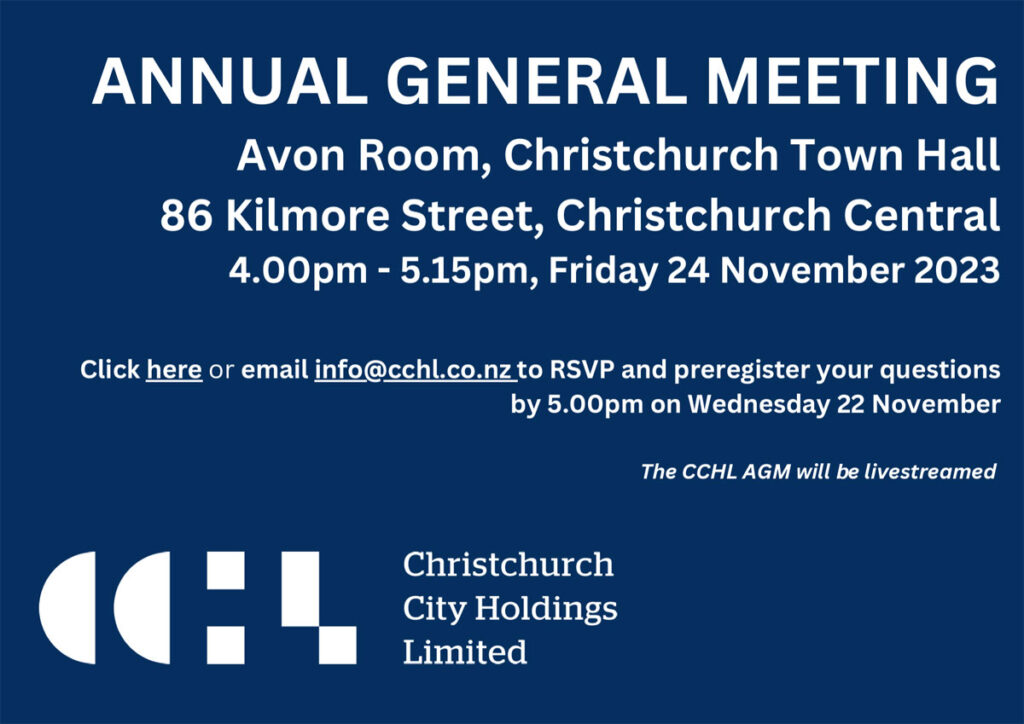The elected reps will be debating the future of CCHL as part of the upcoming Long-Term Plan (LTP). There have been several attempts over the years to sell the city’s trading assets. Everyone unsuccessful. I am sure this will continue with the current council.

When central government sold its trading assets, in the 1980’s and 1990’s, these have been sold several times since. Most times the company selling the shares made significant profits, and the taxpayers of NZ who had supported and paid for their creation, ended up paying more for the services of these companies. With Meridian the government retained 51% of a company which is now worth 10 times what it was floated at.
Sale of assets didn’t happen in Christchurch. This city earned the wrath of the Business Roundtable which wanted these companies to be owned by their members for private benefit. The Business Roundtable then labelled us the “People’s Republic of Christchurch”. We wore this label with pride.
It’s time to look at CCHL’s history and how it came into being. Over the next period leading up to the Long-Term Plan (LTP) I will be writing about how CCC kept its assets when most others sold theirs.
It’s important to reflect on the ethical matter that our elected reps at the Council table hold this company and their assets in trust for future generations. Previous generations looked after them and handed over for generations following them to grow and flourish.
CCHL is totally accountable to the elected mayor and councillors. Not to anybody in the executive or the board members of CCHL. The council must be clear on what it expects from CCHL, and the holding company must carry this out. Over the years there have been examples of board members, and chairs, not following the expectations of the CCC mayor and councillors, and they have been sacked. I will write about some of these over the next period.
The key fact is that the elected reps at the Council table decide what happens with CCHL, who sits on the boards, and what direction they are taking.
What trading departments did CCC have?
The City Council had several divisions which were corporatised.
- One was the Municipal Electricity Department (MED) the local monopoly which supplied power to the ratepayers.
Another was the Port, another monopoly, shared with other Canterbury Local Authorities. - Another was the airport shared with central government.
- Another was the maintenance department of the Council.
All these entities had a council committee to which they were individually accountable.
City Care was formed later than the other companies. This was undertaken to essentially protect the jobs in the maintenance department of CCC in an environment when all the work was to be tendered out as part of the Neo Liberal reforms of the time.
How did CCHL start in the first place?
A series of legislation required local authorities to turn each of their trading enterprises into companies. There was separate legislation for Ports, airports, and electricity operations.
At Christchurch 4 years before any legislation was passed a commercial board was formed for the Municipal Electricity Department (MED) and it was very successful. This move was led by Councillors Derick Anderson and Philip Carter from the Citizens grouping at the Council table, and David Close and Linda Constable from the Labour grouping. Vicki Buck as an independent mayor was also a team member.
The experience with the MED gave the council table the confidence, and experience, to move to create a Holding Company for the other trading enterprises. It was named Christchurch City Holdings Ltd (CCHL).
The port and the airport were then turned also into companies. Most of the local authorities in Canterbury sold their shares and these were then floated onto the Stock Exchange. Christchurch shares were retained and became part of CCHL.
Directors were appointed to each of the boards and these boards reported to CCHL with an annual Statement of Corporate Intent. These were reviewed by CCHL and every three months the chair of CCHL appeared before the elected council and informed members of activities within the CCHL portfolio.
Councillors were encouraged to give feedback on companies, and this was fed back by the chair to the CCHL board and back to the trading enterprises. The Statement of Corporate Intent for CCHL was submitted each year to the full CCC elected reps who could approve or reject it.
This exercise was undertaken against a backdrop of no surprises. There was no interference or involvement by CCC executive in CCHL affairs.
The next article will cover the trading companies and their successes and failures and about the growth of our commonwealth.

Leave a Reply